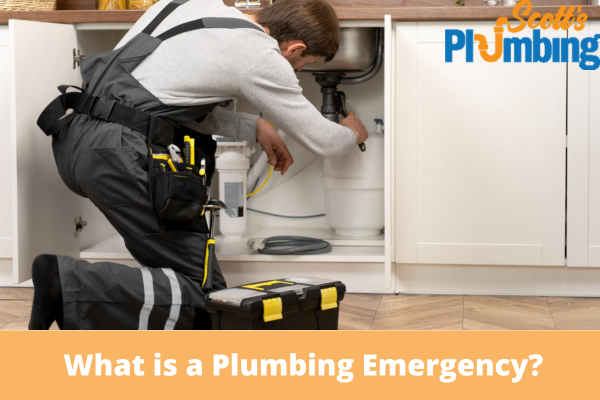Plumbing emergencies might be a homeowner’s worst nightmare. They can not only cause severe physical damage, but they can also create health risks and water waste. As a homeowner, you must understand what defines a plumbing emergency and how to handle it. In this blog, we’ll walk you through the indicators of a plumbing emergency and what to do if one occurs.

Signs of a Plumbing Emergency
Homeowners should look out for several signs of a plumbing emergency. These include:
Burst Pipes
Burst pipes or major leaks are among the most common signs of a plumbing emergency. These can cause significant water damage to your home, leading to mold growth and structural damage.
Sewage Backup
A sewage backup is not only unpleasant but can also pose a severe health hazard due to the presence of harmful bacteria and viruses. If you notice foul odors or wastewater backing up into your home, it’s a clear sign of a plumbing emergency.
Overflowing Toilets
Most overflowing toilets may be fixed with a plunger or another bathroom until the plumber arrives. If you can’t fix the clog and don’t have another bathroom, shut off the toilet’s water supply at the base and call a plumber.
Gas Leaks
Gas leaks can be extremely dangerous, posing a significant risk of fire and explosion. It smells like sulfur or rotting eggs. It may be a gas leak if you hear hissing or whistling near a gas line. See also whether a cloud is building nearby. When you observe one or more indicators, contact an emergency plumber.
Water Heater Failure
A malfunctioning water heater can cause scalding water, property damage, and even carbon monoxide poisoning. If you notice unusual noises or odors coming from your water heater, it’s essential to act quickly and contact a professional plumber.
What to Do in Case of a Plumbing Emergency
If you experience any of the above signs of a plumbing emergency, it’s essential to act quickly to prevent further damage. Here’s what you should do:
- Turn Off the Water Supply: If you notice a burst pipe or a major leak, turn off your home’s water supply. Locate and close the main water shut-off valve. This will halt the flow of water and prevent additional harm.
- Evacuate the Area: If you smell gas or notice hissing noises, immediately contact emergency services. Natural gas leaks can be exceedingly harmful, posing a significant risk of fire and explosion.
- Contact a Professional Plumber: Once you have secured the area and prevented any immediate danger, it’s time to contact a professional plumber. A plumbing emergency necessitates the services of a certified plumber who can analyze the issue promptly and propose the best solution to prevent more damage.
Conclusion
Understanding what qualifies as a plumbing emergency and knowing how to respond to it can significantly protect your home and loved ones from damage and harm. Taking swift action and contacting a reliable plumber in a plumbing emergency is essential.
If you need professional plumbing services, you can trust the experts at Scott’s Plumbing. Our experienced plumbers are always ready to handle any plumbing emergency. We also offer routine maintenance services to prevent potential issues from escalating into emergencies. Contact us to schedule an appointment or request a quote for our services!



